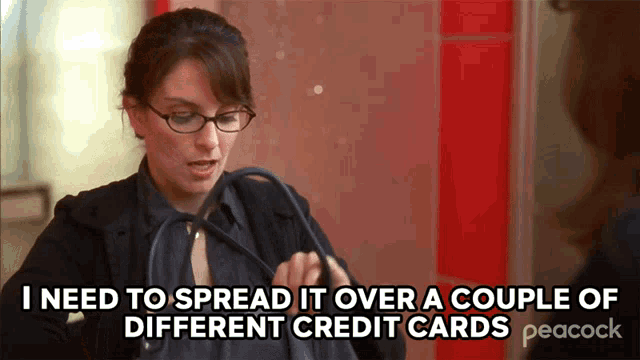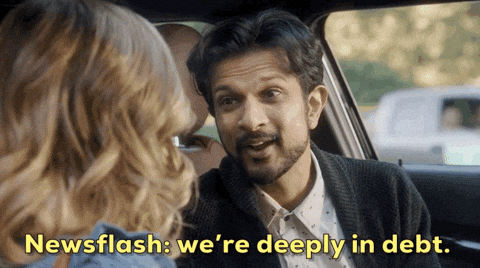Getting denied for a credit card is like discovering that your pizza exploded in the oven. Both are really double-whammies of bad news.
With exploding pizza, you now have no pizza and you have to clean up your oven.
With a credit card denial, you now have no credit card and you have to find out why you were rejected – a sticky mess in its own right.
Unlike exploding pizza, though, there’s a silver lining to getting rejected for a credit card. It’s usually the first sign that something’s off in your financial picture, and it gives you a chance to tune everything up before a much bigger milestone approaches, like a mortgage or a student loan refinancing.
1. Your credit score is too low

The most common reason folks, in general, get rejected for credit cards is simply because they don’t have the right credit score.
Generally speaking, most rewards cards require a credit score of Good (670+) or higher to successfully apply. However, many super-rewarding cards with industry-leading benefits require Very Good (700+) credit, and some even require Excellent (750+).
Cards with the highest credit requirements often include:
- Top-tier rewards cards like the Chase Sapphire Preferred® Card.
- American Express credit cards.
- Rewards cards with 0% APR on balance transfers like the Citi® Double Cash Card.
2. You have a limited credit history
Folks under 30 often get rejected for credit cards not because they have bad credit, but because they have no credit. In fact, having no credit history can actually be worse in some cases.
Typically, credit bureaus need at least one active account from the last six months to generate a credit score for you – be it another credit card, student loans, etc. If they don’t, when the bank asks them about your credit, they just go:
Thankfully, having no credit history is easier to fix than having bad credit.
If you have no credit history, consider applying for a secured credit card.
3. There are too many recent hard pulls of your credit

When you apply for a loan or a line of credit, the lender will typically make what’s known as a hard pull of your credit.
This is when they request a detailed report of your credit history from the credit bureaus so they can determine whether or not you’re worthy of being given a loan or a credit card.
Even though hard pulls are unavoidable, they still ding your credit score by three to five points each. Hey, I didn’t make the rules.
Now, a single hard pull won’t affect your credit that much, but if you apply for too many loans or lines of credit in a short period of time, it’ll add up quickly and may downgrade your score from Very Good to Good, Good to Fair, etc.
It’s yet another reason why you always want to check your credit score before applying for a credit card.
4. You’ve maxed out your other card
Maxing out a credit card is one of the fastest ways to torpedo your credit score.
First, it hurts your credit utilization, which makes up 30% of your credit score. If you have a card with a spending limit of $5,000, and your balance is $4,000, your credit utilization ratio is 80% – and anything above 50% is generally considered a red flag.
Second, it makes it highly likely that you’ll miss a payment – and your payment history makes up 35% of your credit score.
5. You already have too much debt in general

To preface, not all debt is bad. Debt can be healthy, since having a mix of loan types and making on-time payments are what builds your credit.
The key is to have a low debt-to-income (DTI) ratio. Your DTI is your monthly debt payments divided by your gross monthly income, and a DTI under 43% is generally considered acceptable.
If a bank sees that you’re not making enough money to pay off your existing debts, they’re going to assume that you’ll struggle to pay off your card balance with them.
6. You have a history of late payments
At 35%, your payment history makes up more than a third of your credit score – so any missed payments can be a serious gut punch.
Like speeding tickets, late payments are generally forgiven after a few years. But if your credit report shows any recent late payments, you’ll want to ID them and plug those leaks immediately.
7. You’ve recently filed for bankruptcy
This one may seem pretty apparent, but if you have a recent bankruptcy on record, you’ll have a tough time applying for a new credit card.
Since active bankruptcies can still include newly-opened lines of credit, banks typically won’t give you a second look until your bankruptcy has been discharged for a while and you’ve built your credit back up.
8. Your income is too low
Similarly, your credit card application may be rejected if the bank thinks you don’t make enough money to pay off your balance each month.
You also never want to lie about your income on a credit card application, because yeah, they check. Small differences aren’t a big deal – like if you report $70k and end up making $63k that year, they won’t gig you for that. But if you report $120k to the banks and $12k to the IRS, you might go to jail like this guy.
If you’re a student working part-time, consider our list of the best credit cards for college students.
9. You haven’t been at your new job long enough
Banks like to see evidence of steady income. It makes them feel more confident that you’ll be able to pay your credit card bills.
Therefore, an erratic work history or long periods of no income can be red flags on a credit card application.
If you’re about to get a new job, consider reapplying once you’ve been at your new gig for at least a month.
10. Your rent is too high

A lot of folks ask why “housing payment” appears on a credit card application, and the reason is simple: for most Americans, it’s their biggest monthly expense.
So when banks ask about it, they’re trying to get a quick idea of how much money you make each month after paying rent.
Someone making $60k in the Bay Area, where rent is $2,700, won’t have much money left over to pay their credit card bill each month, and thus is less likely to get their credit card application approved.
11. The application was filled out incorrectly
If I got a credit card rejection letter that started with:
“Dear Crhis,”
I’d start to suspect I may have filled out the application too fast.
Credit card applications are short, but vital. A misplaced digit in your birthday, SSN, or address will all lead to the bank being unable to verify your identity and swiftly reject you. Take your time and triple-check your work.
12. You’re not 18
This one’s pretty cut-and-dry – if you’re not 18 yet, you can’t legally have a credit card yet.
If you’re wondering how your friends all have credit cards with their name on them, it’s most likely because they’re authorized users on their parents’ credit card account. The bank printed them a card that they can use, but the account is in their parents’ name.
I can’t guarantee your folks will be willing to add you as an authorized user, but I can tell you this; most banks let you do it for free.
13. Your credit report is frozen
Freezing your credit is synonymous with locking up your credit report so nobody can see it. It’s used as a defense against identity theft since it prevents the thief from taking out loans or lines of credit in your name. Your credit bureau may have frozen your credit for you to defend from a security breach, or you may have done it yourself and forgotten!
Equifax, TransUnion, or Experian will notify you when there’s been an attempted hard pull of your credit – so check your spam folder, see which credit bureau it was, and ensure your credit isn’t frozen before reapplying.
What to do after your credit card application is denied
Call and ask why
If you’re unsure why your application may have been denied, you have the right to call up the issuer and ask them why. In fact, the Equal Credit Opportunity Act (ECOA) requires lenders to let you know why they denied your application.
So, give the credit card company a call. You may find that there was an error on their part. Or, you may find that there’s an error on your credit report causing it to be lower than you know it should be.

Don’t reapply right away
Even if you have a hunch about why your credit card application was denied, you’ll want to follow that hunch and tighten all of your screws first before applying again. You’ll want to maximize your chances first, since remember, each application results in a ding to your credit score.
If you’re ever rejected for a loan or a line of credit, the very first things to check are:
- Your credit score.
- Your credit report.
Fetch and analyze your credit report (for free)
To get both your credit score and your credit report for free, head to Credit Karma.
Your credit report will contain tons of clues as to where banks might’ve gotten spooked. If you have accounts in bad standing, missed payments, or the like, they’ll be color-coded.
Build your credit
If your credit score is below 670 (i.e. Fair or Poor), then you’ll almost certainly have to bump your numbers before reapplying.
We can help you do that – check out our article on how to build credit the right way.
If you have little to no credit history, you can build your credit in a matter of months, not years. Plus, having good credit will literally pay off when you apply for an auto loan, mortgage, or refinance your student loans.
Reduce your debt-to-income ratio
Remember, your debt-to-income ratio (DTI) is your monthly debt payments divided by your gross monthly income. Banks consider a DTI under 43% is “acceptable” but, to be honest, that’s still a lot of debt. Aim for less than 30%.
Consider a secured credit card
A secured credit card is a credit card that requires you to put down a cash deposit. This gives banks the confidence to extend a line of credit to folks with bad or no credit, since the bank can just keep your deposit if you miss a payment.
When you first open a secured credit card, your deposit becomes your line of credit – usually between $200 and $1,000. Then, as you start making on-time payments, your credit score increases and the bank extends your line of credit past your initial deposit – and soon may offer you a regular rewards card.
Secured cards solve the Catch-22 of “I got rejected because I have no credit, but I can’t build credit without a credit card.” You may only need a secured card for a matter of months, not years, and some even allow for flexible payment dates.
Get pre-approved
If you’re nervous about getting rejected again despite covering your bases, consider getting pre-approved instead!
When you get pre-approved for a credit card, you’re essentially giving the bank as much information as possible without a hard pull of your credit. Then, the bank tells you which cards you’ll most likely get fully approved for.
Under 18? Become an authorized user on someone else’s card
Hopefully, if you’re under 18, the bank didn’t even bother making a hard credit pull before denying your application.
In the meantime, you can start building credit by becoming an authorized user on your parent or guardian’s credit card. Yep, you read that right: if both you and the primary cardholder use your cards responsibly and make on-time payments, you’ll both build credit.
Becoming an authorized user is one of the most effective ways for someone under 18 to start building credit. Just be sure that whoever you piggyback onto is responsible with their credit card!
Summary
Getting denied for a credit card, like exploding pizza, can feel like a double-whammy of disappointment. Not only did you not get the card, you now have a mess to clean up.
But the process of tuning up your credit score and personal finances won’t just help you reapply – it’ll save you massive time, money, and stress in the long run.